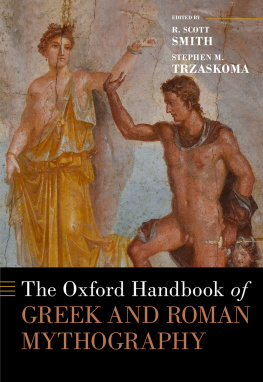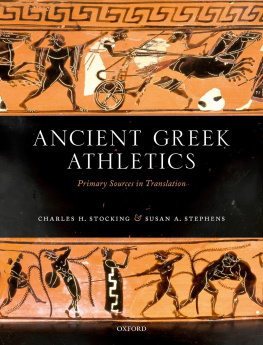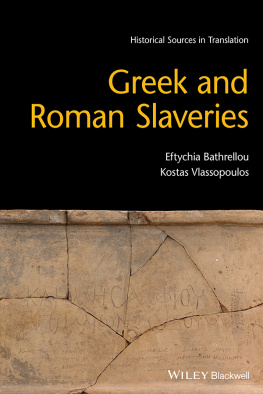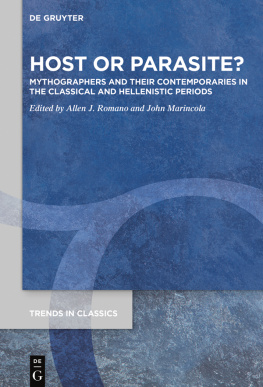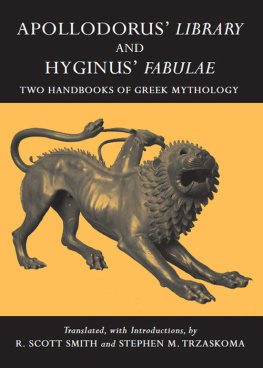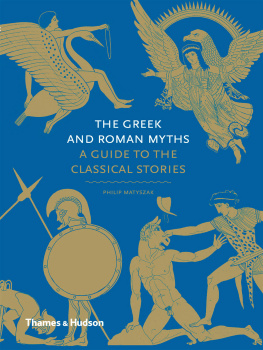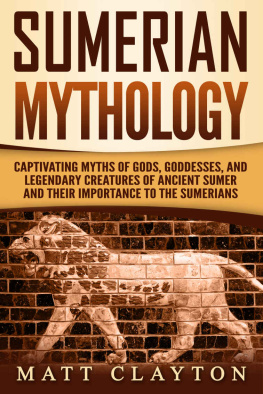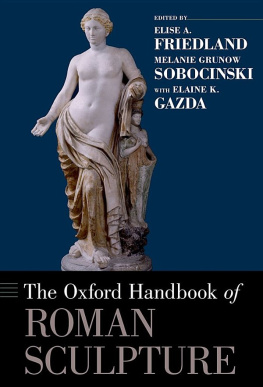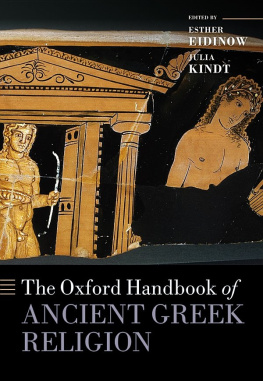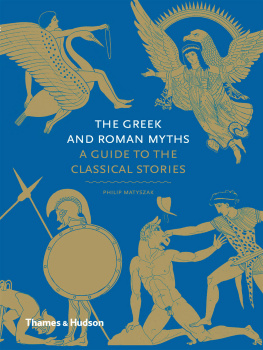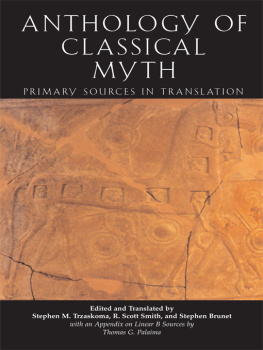The Oxford Handbook of
Greek and Roman Mythography

Oxford University Press is a department of the University of Oxford. It furthers the Universitys objective of excellence in research, scholarship, and education by publishing worldwide. Oxford is a registered trade mark of Oxford University Press in the UK and certain other countries.
Published in the United States of America by Oxford University Press
198 Madison Avenue, New York, NY 10016, United States of America.
Oxford University Press 2022
All rights reserved. No part of this publication may be reproduced, stored in a retrieval system, or transmitted, in any form or by any means, without the prior permission in writing of Oxford University Press, or as expressly permitted by law, by license, or under terms agreed with the appropriate reproduction rights organization. Inquiries concerning reproduction outside the scope of the above should be sent to the Rights Department, Oxford University Press, at the address above.
You must not circulate this work in any other form and you must impose this same condition on any acquirer.
Library of Congress Cataloging-in-Publication Data
Names: Smith, R. Scott, 1971- editor. | Trzaskoma, Stephen, editor.
Title: The Oxford handbook of Greek and Roman mythography /
[edited by] R. Scott Smith and Stephen M. Trzaskoma.
Description: New York, NY : Oxford University Press, [2022] |
Includes bibliographical references and index. |
Identifiers: LCCN 2022000719 (print) | LCCN 2022000720 (ebook) |
ISBN 9780190648312 (hardback) | ISBN 9780197642511 (epub)
Subjects: LCSH: Mythology, Classical.
Classification: LCC BL723 .O94 2022 (print) | LCC BL723 (ebook) |
DDC 292.1/3dc23/eng20220521
LC record available at https://lccn.loc.gov/2022000719
LC ebook record available at https://lccn.loc.gov/2022000720
DOI: 10.1093/oxfordhb/9780190648312.001.0001
In memory of Ellie and Ezio.
Contents
R. Scott Smith and Stephen M. Trzaskoma
Pura Nieto Hernndez
Jordi Pmias
R. Scott Smith and Stephen M. Trzaskoma
Charles Delattre
R. Scott Smith
Evina Sistakou
Ken Dowden
Charles Delattre
Stephen M. Trzaskoma
Manuel Sanz Morales
Ilaria L.E. Ramelli
Iris Sulimani
Greta Hawes
David Konstan
K. F. B. Fletcher
Joan Pags
Annette Harder
Nereida Villagra
Joseph Farrell
Hugo H. Koning
Christopher Francese
William Hutton
Chiara Meccariello
Greta Hawes
Ilaria L.E. Ramelli
Ezio Pellizer
Arnaud Zucker
Daniel W. Berman
Irene Pajn Leyra
R. Scott Smith and Stephen M. Trzaskoma
Lee E. Patterson
Maria Pretzler
Claude Calame
Kathryn Topper
Eleanor Winsor Leach
Zahra Newby
Jennifer Nimmo Smith
Benjamin Garstad
Benjamin Garstad
Jon Solomon
We have many people to thank, the most prominent of whom are our colleagues Piero Garofalo (Italian, UNH) and Christopher Gregg (Art History, GMU), who gave us valuable guidance on several chapters. In addition, we are grateful to the John C. Rouman Classical Lecture Series for several grants that supported the work in these pages, as well as the Dion Janetos Fund for Hellenic Studies, which subsidized the building of our index. We also wish to thank the Office of the Dean of the College of Liberal Arts and the Office of the Provost at the University of New Hampshire for their support, including two sabbatical periods. The Undergraduate Research Team of the UNH Greek Myth Lab contributed to this work in sundry but important ways. Finally, we are tremendously grateful to our contributors who, despite past and current challenges, responded with outstanding scholarship that will doubtlessly frame future work in this field.
Daniel W. Berman is Professor of Greek and Roman Classics at Temple University. His most recent book is Myth, Literature, and the Creation of the Topography of Thebes (Cambridge University Press, 2015). His interests lie primarily in the areas of myth and mythography, and specifically the representation of urban and built space in the Greek and Roman mythic traditions.
Claude Calame is Director of studies at the cole des Hautes tudes en Sciences Sociales in Paris (Centre AnHiMA: Anthropologie et Histoire des Mondes Antiques); he was Professor of Greek language and literature at the University of Lausanne. He taught also at the Universities of Urbino and Siena in Italy, and at Yale University in the US. In English translation he has published many books on Greek history, literature, and myth, including, Greek Mythology. Poetics, Pragmatics and Fiction (Cambridge University Press 2009). His latest book in French is La tragdie chorale. Posie grecque et rituel musical (Les Belles Lettres 2018).
Charles Delattre is Professor of Ancient Greek Language and Literature at the University of Lille. His research focuses on ancient narrative practices involving the modern notion of mythology. He devotes himself to the annotated edition of part of the mythographic corpus and to a reflection on contemporary definitions of myth from a perspective of literary theory and cultural anthropology.
Ken Dowden is Professor Emeritus of Classics at the University of Birmingham. He is well known for his work on mythology (Death and the Maiden, Routledge 1989; Uses of Greek Mythology, Routledge 1992; and, with Niall Livingstone, the Companion to Greek Mythology, Blackwell 2011), as well as on religion, Homer and latterday authors who contested Homers veracity. For Brills New Jacoby he has edited, translated and commented on many fragmentary Greek historians (from Aristeas of Prokonnesos and Diktys of Crete to Poseidonios and Dio Chrysostom), some of whom engaged in wilful mythographic activity. His interest in the ancient novel has focused mostly on Apuleius and Heliodoros, typically on their religio-philosophical aspects, a mythology of its own.
Joseph Farrell is Professor of Classical Studies at the University of Pennsylvania, where he has taught since 1984. The focus of his work is ancient Latin poetry, including its relationship to Greek poetry and to Greek and Roman literary scholarship, along with its reception from later antiquity to the present. His most recent book is Junos Aeneid: A Battle for Heroic Identity (Princeton University Press, 2021).
K. F. B. Fletcher is Associate Professor of Classics at Louisiana State University. His research focuses primarily on the Roman use of Greek mythology, especially in mythography and Augustan poetry. In addition to articles and book chapters on a wide range of Roman poets and mythographers, he is the author of Finding Italy: Travel, Nation, and Colonization in Vergils Aeneid and coeditor of Classical Antiquity in Heavy Metal Music.
Christopher Francese is Asbury J. Clarke Professor of Classical Studies at Dickinson College in Carlisle, Pennsylvania, USA. He is the author of Parthenius of Nicaea and Roman Poetry (2001), Ancient Rome in So Many Words (2007), and, with R. Scott Smith, Ancient Rome: An Anthology of Sources (2014). He is the project director of Dickinson College Commentaries (dcc.dickinson.edu).
Benjamin Garstad is Professor of Classics at MacEwan University in Edmonton, Alberta. His research concentrates on the literature of Late Antiquity, especially John Malalas and the origins of the Byzantine chronicle tradition, the

